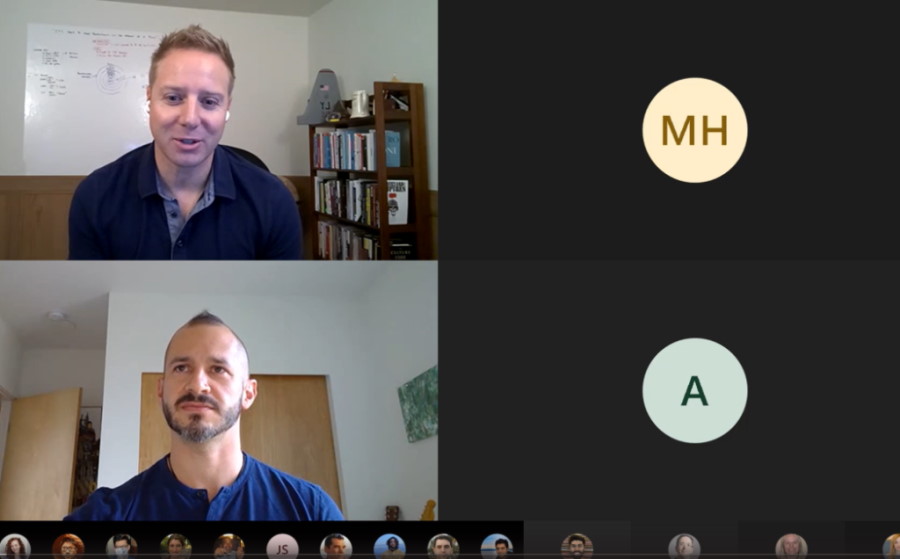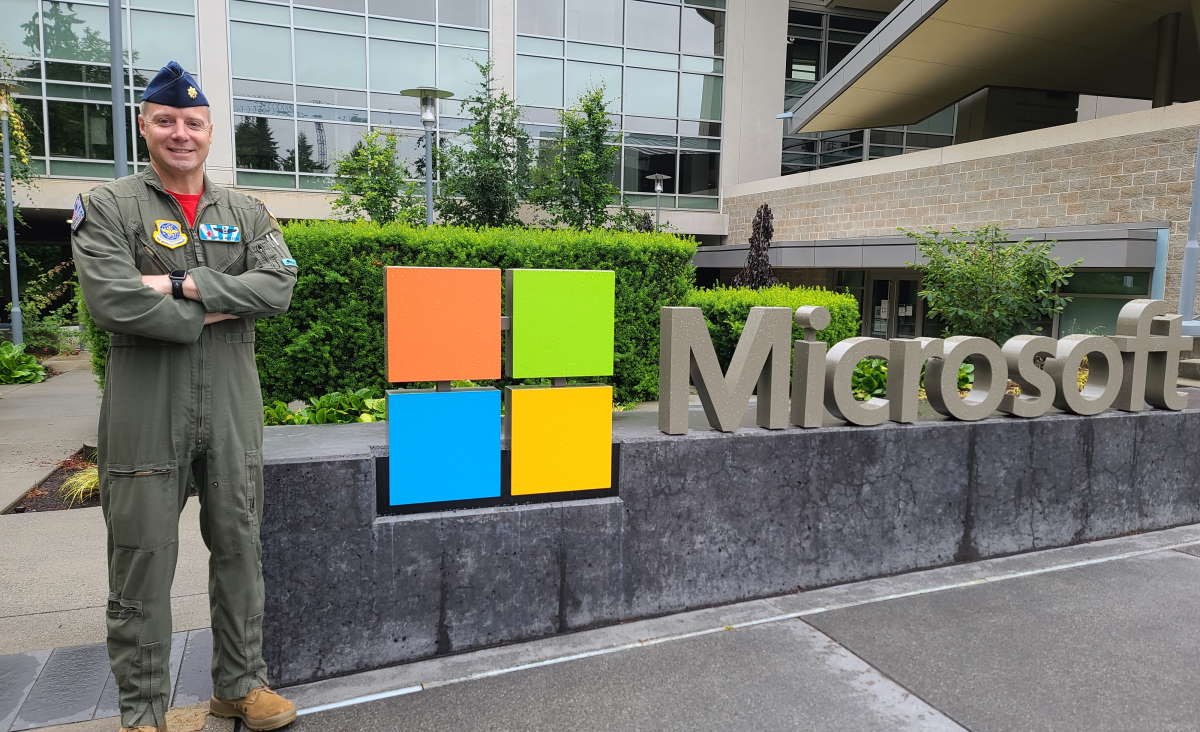At Microsoft, employees are trying new things and embracing lessons from success – and failure. They’re seeking out diverse perspectives in a culture that practices a growth mindset. The annual company-wide Microsoft Global Hackathon, produced by The Garage, is a big part of that culture. The Garage was honored to work with Major Ryan “Merlin” Middleton of the U.S. Air Force for the past year to bring a different spin on innovation, learn from Hackathon projects, and help move ideas forward. Middleton’s time at The Garage has helped Microsoft employees push innovative ideas upstream, and hone strategies that translate to other organizations, like the Air Force.
When Middleton embedded with The Garage in July 2020, he brought 20 years of Air Force leadership experience to the group, eager to share his insights and discover how The Garage provides a safe space for Microsoft employees to invent and explore.
In years past, Middleton had traveled the world on cargo aircraft delivering troops, medical aid, and supplies, meeting new people, and experiencing different cultures. He joined the Air Force to have an adventure and ended up with an exciting career. Most recently, Major Middleton came from the Chief of Staff of the Air Force’s Blue Horizon Fellowship, a ten-month program that teaches officers how to create and test prototypes with strategic potential.
“I get the opportunity to work with really talented and motivated individuals, and there’s always something new keeping me intellectually curious and growing,” said Middleton. That curiosity-driven approach to life seemed a natural fit for the Air Force Research Lab (AFRL), the organization Middleton is a part of now, with thousands of active-duty military, civilian scientists, and engineers. Their charter is focused on emerging trends, conducting experiments to demonstrate value and determine military utility of different technologies. Middleton came to The Garage to learn from another organization that seeks to identify and grow prototypes for business value.
Major Ryan Middleton of the U.S. Air Force
Similarities and Differences
From the start, Middleton noticed similarities and differences between the Air Force and Microsoft. Whether someone is in the military or at Microsoft, everybody wants to be appreciated for the work they do and know that their work has an impact on the mission. “How do you do that and promote those values in a large bureaucracy or corporation? Those are similar questions that I think we ask ourselves all the time, how can we encourage employees to share their ideas and how do we give them resources to grow?” Leadership across both entities have consistently invested resources in those areas.
Another similarity is the question of how to socialize ideas outside of one’s immediate group and gain traction. Middleton remarked, “That is one of The Garage’s strengths – so that people can focus on creativity and the value of their idea, and The Garage can help you connect with the right people to grow and validate your idea. I think that’s something a program like The Garage does really well.” Groups in the Air Force are trying to do the same, to share ideas outside of their squadron and reach other teams.
One area of difference he perceived was working with a majority of teams applying software solutions. At Microsoft, many of the teams have the skills and tools to quickly create and test software prototypes to solve a problem. While the Air Force does offer pathways to field solutions rapidly, many solutions require tools beyond software, which removes the rapid, low-barrier to entry advantage that software-only solutions provide.
After working on almost twenty Hackathon projects, Middleton has internalized the benefit and importance of having a “hack culture.” Hackathons bring groups together, promote cultural values, and are a way to source and identify ideas that have business value from all over the company. It connects teams with their senior leaders who ask challenging questions that make projects better.
After his time at Microsoft, his perception of the company has evolved. “I assumed Microsoft had incredibly talented people and that’s just been reinforced as I’ve worked with employees across the globe.” One notion– that innovation came easier to a company like Microsoft – proved incomplete. “Being part of a large tech corporation with a reputation for excellence doesn’t mean there’s a magic formula to make solving problems any easier. You still need to rely on each other, work as a team, set goals and overcome challenges together. It’s true for any organization regardless of what size or industry,” said Middleton.
Coalition of the willing
Something that hackathon teams know well, as the nature of how a hack project forms is through a coalition of the willing, each person bringing their own set of skills and insights to the challenge. Hackathon projects lend themselves to self-organizing and dividing the work amongst team members. Scrappy and fast-moving to develop something in just a few days, hack projects are propelled by employees who are passionate about a cause or solving a problem that affects their lives, and not necessarily related to their day job. The freedom to decide what to hack on is just one of many reasons why employees choose to participate in the Hackathon.
Maj Middleton worked alongside Ed Essey, the Garage’s Director of Intrapreneurship. Essey has spent the past few years embedding with Hackathon winning teams to move projects forward through proof-of-concept, validation/vetting the solution, to sponsorship and integration. Together they coached teams at all stages of the project lifecycle.
“One of the first teams I met when I joined The Garage was the project team behind MirrorHR.” MirrorHR built an Epilepsy Research Kit for kids – a tool to empower doctors and caregivers through biometric and contextual information to provide personalized care. “That’s what endeared me to come here for this opportunity, I saw the types of projects I’d be working with, like MirrorHR, and the quality of the people behind the projects,” Middleton explained.
Hackathon winners had opportunities to present to Microsoft senior leadership throughout last year. They showcased their employee-led innovations, and Microsoft executives responded with encouragement, feedback, and guidance, opening doors for them to accelerate progress.

Middleton and Essey coaching Hackathon winners on a Microsoft Teams call
The core principles for innovation – of looking at something from different angles, running small experiments to try things quickly, testing the hypothesis, validating parts of a solution, then iterating to improve, pivot, or scrap – are familiar paths that Middleton has followed in the military and in his time coaching hack teams with The Garage. In addition, he brings an outside perspective and, in his own words, “I ask questions that others who are familiar in the space might not think to ask. In the military, a lot of what we do has to align not just tactically but also with strategic vision of the Department of Defense. So, when I engage with Microsoft employees, I naturally consider how their project aligns with the strategic vision of Microsoft.”
Project teams have members who think very critically and analytically about the solution, individuals who dive deep into the technical aspects of an engineering problem. “That’s not where I found my Air Force experience added value.” Middleton admitted. “I’m thinking more about, what’s the message we want to send and did we invoke all the right emotions – excitement, curiosity, empathy.”
Creating connections and sharing knowledge
Amongst the technical feats and challenges of a project, is the narrative of the team itself, their diverse backgrounds, and the customer journey. These are all important highlights in the presentation. Coaching also taught teams to demonstrate how a project aligns to an executive’s strategy and ways to use language that resonates with them.
Middleton and Essey coached teams to play off each members’ strengths. “That’s part of the challenge of the executive review meetings – we want to make sure all of the teams’ strengths are amplified in a way that has the greatest impact for the presentation,” Middleton explained. “We want to leave the executives with the best possible impressions, because each team has put their heart into these projects, fine-tuning for weeks or months, and it’s their moment to shine.”
He will be taking lessons and strategies back to the Air Force and sharing his experience with his leaders and colleagues. “On a tactical level I’ve learned so much. How to run small experiments, demonstrate business value, earn sponsorship, communicate to executives and their staff in private industry. How to have fun while running team meetings. I’ve also explored other areas such as cultural norms that make everyone feel included and accepted.”
When asked what he enjoyed most about his Microsoft experience, Middleton had a lot to share. “I love meeting new people who are excited about the work they’re doing – that energy spreads and is really motivating. The global Garage team have put together events and offerings that make a difference for Microsoft and its employees. The second thing I’ve really enjoyed is the smiles from the teams who’ve felt like they’ve put their best foot forward and shared their Hackathon work with an executive, and that leader is grateful, and the team is so proud of what they’ve produced. Those are fun moments. Innovation can be hard work, so you really have to celebrate the moments of gratitude.”
Without a doubt, his collaboration has helped The Garage engage with Hackathon teams and reshaped the process of coaching for projects. In fact, the refined coaching techniques helped make last year the best year yet of Hackathon winner presentations, with higher levels of leadership engagement, action, and forward project trajectory.
Though Middleton will embark soon on his next assignment, he and the AFRL are keen to run a hackathon for their employees. The Garage is looking forward to being invited to collaborate.

